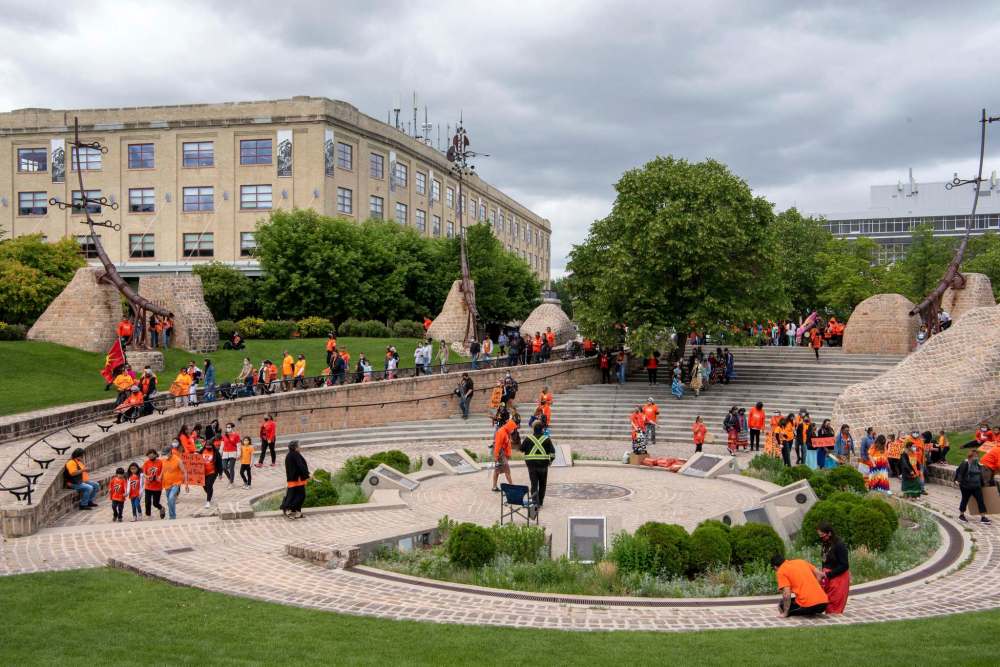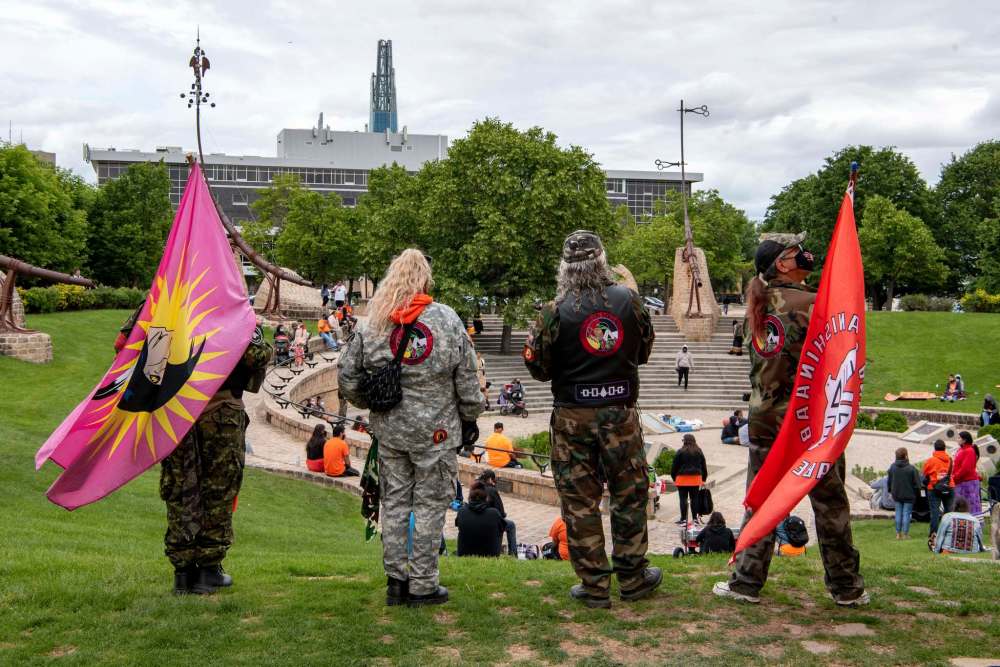‘We’re not being put down anymore’
Winnipeg march calls for release of all residential school records
Advertisement
Read this article for free:
or
Already have an account? Log in here »
To continue reading, please subscribe:
Monthly Digital Subscription
$1 per week for 24 weeks*
- Enjoy unlimited reading on winnipegfreepress.com
- Read the E-Edition, our digital replica newspaper
- Access News Break, our award-winning app
- Play interactive puzzles
*Billed as $4.00 plus GST every four weeks. After 24 weeks, price increases to the regular rate of $19.95 plus GST every four weeks. Offer available to new and qualified returning subscribers only. Cancel any time.
Monthly Digital Subscription
$4.99/week*
- Enjoy unlimited reading on winnipegfreepress.com
- Read the E-Edition, our digital replica newspaper
- Access News Break, our award-winning app
- Play interactive puzzles
*Billed as $19.95 plus GST every four weeks. Cancel any time.
To continue reading, please subscribe:
Add Free Press access to your Brandon Sun subscription for only an additional
$1 for the first 4 weeks*
*Your next subscription payment will increase by $1.00 and you will be charged $16.99 plus GST for four weeks. After four weeks, your payment will increase to $23.99 plus GST every four weeks.
Read unlimited articles for free today:
or
Already have an account? Log in here »
Hey there, time traveller!
This article was published 21/06/2021 (1718 days ago), so information in it may no longer be current.
As the people flowed down Broadway, smudged with wafting tendrils of sweetgrass smoke and led by silver-haired elders, Joelyne Bighetty looked at the residential school survivors and jingle-dress dancers and families pushing strollers, and saw something bigger than a single march.
In that crowd, 150 strong as it began its walk from the Manitoba legislature, she saw Indigenous people rising.
“It’s very overwhelming in my heart to see our people come together,” Bighetty said, chatting after the march reached Oodena Circle at The Forks. “It shows that we’re waking up as a community, and we’re not being put down anymore.”

Organized by Bighetty and other members of the First Nation Indigenous Warriors, a four-year-old movement founded in Winnipeg, the Monday afternoon march was the latest in a series of events across Canada, calling for more to be done to secure justice for those who survived residential schools — and those who did not.
This latest wave of rallies and protests was sparked by last month’s grim discovery of the unmarked graves of 215 children outside the former Kamloops Indian Residential School in Tk’emlups te Secwépemc First Nation. The B.C. discovery has spurred renewed calls to uncover the truth of those lost to residential schools.
The Truth and Reconciliation Commission of Canada has estimated about 6,000 children died in the residential school system, about one death for every 25 children who were taken. Many bodies were never returned to their family, and in about one-third of those deaths, even the name of the child was not recorded.
There is hope for the truth to be uncovered. In chants and speeches, attendees at Monday’s march called on the Catholic Church to release all records pertaining to residential schools. They held aloft signs that read “Every Child Matters,” and called for federal support in locating more such unmarked graves.
“If they want to move forward from this travesty, they have to provide those records,” said Musinaw Mistatim, a Roseau River Anishinaabe First Nation member who helped lead the chants.
“It’s all empty words if they don’t provide those records. It’s empty words from the government, the church, the RCMP, all those entities that took part in operating those schools.”
To most at the Winnipeg march, the legacy of residential schools is fresh in memory. Leading were about a dozen survivors, including Geraldine (Gramma) Shingoose, a well-known elder who made headlines when Montreal Canadiens goalie Carey Price visited her vigil outside a downtown church early this month.
Their stories highlight just how long a journey it has been, to bring the full story of the schools to light. Mistatim’s father, who died in 2000, was a survivor who fasted outside the Parliament buildings in Ottawa to call attention to the truth of residential schools, took his kids to powwows, and fought for Indigenous language education.
“That’s the part they tried to snuff out of us, but that’s what makes us survivors,” Mistatim said. “We have lost a lot, but they’ve held onto so much, and it’s because of those survivors upfront that are leading us in this march. They held onto those things for us.”

Now, march organizers believe, that work has paved the way for a resurgence.
Bighetty, who is Cree from Mathias Colomb First Nation, is part of the first generation of her family not to attend residential school: her grandmother, Theresa Bighetty, is a survivor, as well as a respected elder and knowledge-keeper who, along with other members of their family, has long advocated for justice.
Sometimes, Bighetty looks at her own children, and feels her heart break to know, in a different time, they would have been taken away to schools. However, the same issues are still at play, she says, in how many children are taken into CFS care: the goal of marches like these, she said, is to make all of Canada aware.
“We’re not going to be shoved under the carpet anymore,” she said. “People are being woken, and this is just the tip of the iceberg,” she said. “I think there’s going to be a lot more protesting and marches in the future.”
melissa.martin@freepress.mb.ca

Melissa Martin
Reporter-at-large
Melissa Martin reports and opines for the Winnipeg Free Press.
Every piece of reporting Melissa produces is reviewed by an editing team before it is posted online or published in print — part of the Free Press‘s tradition, since 1872, of producing reliable independent journalism. Read more about Free Press’s history and mandate, and learn how our newsroom operates.
Our newsroom depends on a growing audience of readers to power our journalism. If you are not a paid reader, please consider becoming a subscriber.
Our newsroom depends on its audience of readers to power our journalism. Thank you for your support.



